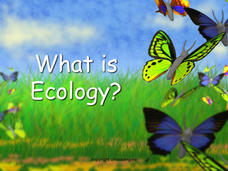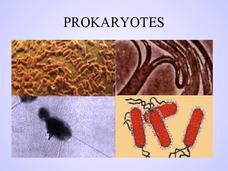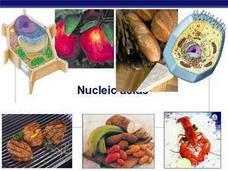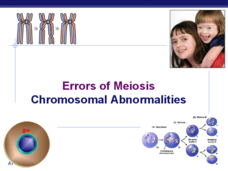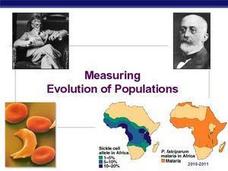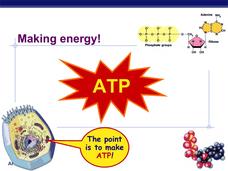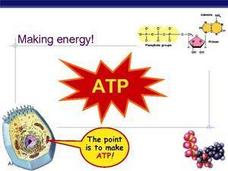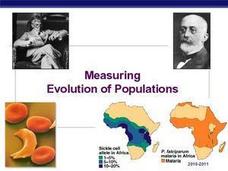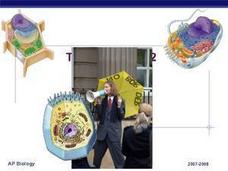Biology Junction
Plant Diversity
Ginkgo trees existed for more than 350 million years, and, at this time, only one species still remains. While plant diversity generally increases over geologic time, some interesting exceptions occur. Young scientists learn about plant...
Curated OER
Cellular Respiration stage 1: Glycolysis
Ten reactions involved with the process of glycolysis within cellular respiration are summarized here. The aerobic stages and anaerobic interactions leading to fermentation are detailed and wonderful diagrams to support the information...
Curated OER
Kidney Structure and Function: removing intracellular waste
Your class will learn all about the function of the kidney and how it operates in animals from different habitats. The methods of absorption, filtering and excretion are detailed and pupils will learn of the different...
Roland Park Country School
Butterfly or Moth?
What is the main difference between a moth and a butterfly? Butterflies have club-shaped antennae, while moths have a feather-like antennae. But what else differentiates these beautiful insects? The presentation in the resource...
Mr. E. Science
Climate and Climate Change
What factors make up climate? How does longitude and latitude affect climate? What is causing Earth's climate to change? These questions are the topic of a presentation that explains characteristics of climate and climate change.
Biology Junction
What Is Ecology?
Do you know the name for the biological study of interactions? A short presentation with accompanying worksheet introduces individuals to ecology. The materials offer a broad overview of the subject and the levels of organization to...
Curated OER
ChalkBoard Challenge
This is a nicely designed jeopardy game with the categories animals, space, rocks, simple machines, and weather available for 5 values. There are some non-essential sound effects included. The links work and you can return to the...
Curated OER
Prokaryotes
The cellular and genetic organization of Prokaryotes, and the main characteristics of their movement and structure are summarized in this presentation. They are compared to Eukaryotes and that information will help your students...
Curated OER
Photosynthesis
If you need summary notes for independent study, or a Powerpoint to review as a class, then these slides will fit your need. There are really great, quite detailed, diagrams and some slides to summarize the 2 stages of reactions in...
Curated OER
Regulating the Internal Environment
This presentation begins with the many problems multicellular organisms which rely on diffusion encounter. There are many diagrams of mammalian organ structures, and they are labelled with their relevant functions. This an excellent...
Curated OER
Animal Nutrition, Variations, Adaptations & Regulation
Information about digestion of various food components is given in this PowerPoint. The diets of herbivores and carnivores are compared, and there are many diagrams giving details of their digestive system specializations. The...
Curated OER
Chemistry of Carbon
After giving basic details about the properties of carbon, some of the common functional groups and molecules are featured. There is some information about specific functions and impact on the human body. The diagrams are helpful and...
Curated OER
Nucleic Acids: information storage
This sequence of slides covers each main macromolecule that is involved with human structure and function. The history of nucleotide research and the way that they are formed is summarized, a diagram accompanies the explanation. The main...
Curated OER
The Cell Cycle: Cell Growth, Cell Division
Help your students understand cell division. Explore the topics of mitosis by examining the details of chromosomes at interphase, metaphase, anaphase, prophase, and telophase. Wonderful slides will keep your students' attention...
Curated OER
Errors of Meiosis: Chromosomal Abnormalities
After viewing these concise summaries of the common chromosome abnormalities that cause disorders, students' understanding of genetic errors will be much better. This presentation has clear diagrams to accompany the explanations....
Curated OER
Measuring Evolution of Populations
The Hardy-Weinberg principle is the focus of this concise slideshow. Some vocabulary definitions are given on the first 2 slides, and the rest are given over to examples of the Hardy-Weinberg theorem. Calculations of the H-W...
Curated OER
Making Energy: ATP
The main concepts behind how ATP transfers energy are explained in this Ap Biology PowerPoint. The diagrams convey the information that students need for any test regarding phosphorylation. The steps are clear, and should help...
Curated OER
The Point is to Make ATP
Storing and transferring energy is explained here with reference to the fight or flight response, along with the need for activity in times of lowered nutrition. This is a great summary of ATP applications, and after the multiple stages...
Curated OER
Cellular Respiration: Electron Transport chain
If you need a clarification of the electron transport chain for your pupils, then this slide show will be a great help. There are nice images of the membranes and elaborations of chemiosmosis which will provide learners support with...
Curated OER
Photosynthesis:The Calvin Cycle
From the light reaction to the Calvin cycle, this presentation contains information about the various stages of photosynthesis. This is a great supplement to some of the biochemistry-heavy presentations about the specific...
Curated OER
Control of Eukaryotic Genes
Covering the molecular interactions involved with DNA packing and the control of gene activity in depth, this slideshow is useful for higher-level biology students. The biochemical components of protein translation are diagrammed and...
Curated OER
Measuring Evolution of Populations
The five agents of evolutionary change are reviewed in this slideshow. Definitions of common terms involved with populations and equilibrium are given, and there are some presentations of Hardy Weinberg equations for common examples of...
Curated OER
Tour of the Cell 1
Each of these slides deals with an individual organelle and displays a diagram along with labels of the structures. The most useful components of this slideshow are the summaries of functions and descriptions of how the organelles are...
Curated OER
Tour of the Cell 2
As your class views each slide, they will be introduced to the organelles and structure of the cell. Details about structure and function are given and also some trivia about their frequency and population. There is also some...
Other popular searches
- 4th Grade Life Science
- Life Science Inquiry
- Life Science Vertebrates
- Life Science Experiments
- K 2 Life Science
- Life Science on Cells
- Life Science Lesson Plans
- Grade 4 Life Science
- Life Science Report Topic
- Australia Life Science
- The Life Science
- Life Science Lessons







